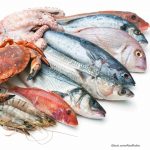The FDA and EPA have issued advice about eating fish, geared toward pregnant women, women of child-bearing age, breastfeeding mothers, and parents of young children. The issue regarding fish consumption is mercury content. A reference chart sorts 62 types of fish into three categories: "Best choices" you can eat two to three times a week; "good choices" that you can eat once a week, and "fish to avoid." Fish in the "best choices" category include almost 90% of the fish eaten in this country. FDA conducted an analysis of fish consumption data and found that 50% of pregnant women surveyed ate less than 2 ounces a week. That is much less than the recommended amount. The nutritional benefits of eating fish are important for growth and development during pregnancy and early … [Read more...]
EWG Warns of Mercury in Seafood
Environmental Working Group (EWG) has produced a new study called "U.S. Fish Advice May Expose Babies to too Much Mercury." In it, they say that "adhering to the federal government's recommendations on seafood and mercury may be risky, potentially leading women to eat too much of the wrong kind of fish." The guidelines were issued as a draft recommendation in 2014 that recommended that women who are pregnant or breastfeeding eat more fish that is lower in mercury. Their tests found that mothers who eat species of fish in the amounts recommended by the EPA and FDA may risk exposing their fetuses to harmful levels of mercury. And those species do not have enough omega-3 fatty acids that are recommended in the diet. Mercury has toxic effects on the nervous, digestive and immune systems, … [Read more...]
Ayurvedic Supplements Recalled for Elevated Lead and Mercury
Butala Emporium of New York is voluntarily recalling eleven Ayurvedic dietary supplement because they contain elevated lead and mercury levels. These compounds can cause health problems for infants, small children, pregnant women, and people with underlying kidney disorders. The lead concentrate exceeds the recommended daily lead exposure for children under the age of 6 and for women of childbearing age. The mercury levels in this product, with short term use, can cause kidney, stomach, and intestinal symptoms. Using these products for more than a month could be lethal. Mercury consumption at these levels can cause psychiatric and personality disturbances, ataxia, visual loss, hearing loss, and other neurological conditions. You can see the long list of recalled products, along with … [Read more...]
Environmental Working Group Releases Seafood Guide
Environmental Working Group has released a "Good Seafood Guide" that helps consumers consume fish and shellfish that are high in Omega-3 fatty acids, low in mercury, and harvested from sustainable sources. The agency offers a calculator, a guide to seafood, and an FAQ on how much seafood people should eat. The calculator lets you input weight, age, gender, pregnancy status, and heart disease condition. A personalized list of which fish to eat will be generated which includes more than 80 species. The seafood is divided into five categories: Best Bets, which include wild salmon and sardines; Good Choices, which include Oysters and Pollock; Low Mercury but Low Omega-3s, which include Shrimp, Tilapia, and Scallops; Mercury Risks Add Up, which include Halibut and Lobster; and Avoid, which … [Read more...]
Consumer Reports States Pregnant Women Should Not Eat Tuna
Consumer Reports has published a special report about eating fish and mercury exposure. They say that to limit your risk, choose the right fish. And they advise pregnant women to avoid eating tuna altogether. They also recommend that anyone who eats 24 ounces or more of fish per week should avoid species high in mercury. Almost all seafood contains the toxic metal in different amounts. Too much mercury can damage the brain and nervous system, especially in children and fetuses. Adults who consume too much mercury can have problems with speech, sleep, walking, and fine motor coordination. More than 95% of the methylmercury in seafood is absorbed into your body when you eat it. Mercury levels in the northern Pacific Ocean have increased by 30% in the past 20 years, and are expected to … [Read more...]
Best and Safest Fish to Eat in the Summer
The Center for Food Safety is offering tips on the best and safest seafood to eat this summer. Most seafood sold in the U.S. is imported, and less than 2% of those products are inspected for contamination. Moreover, those fish are often caught in places where environmental and health standards are weak or non-existent. By eating locally caught, sustainable seafood, you are protecting your family from foodborne illness as well as potential problems from other contaminants such as PCBs and mercury. Buy local if possible, and choose wild over farmed. If the seafood is farmed, choose that produced in the U.S. Favor fish caught by hook, line, handling, jig, or speargun. Avoid trawl fishing, which is destructive to the environment. Avoid fish high in mercury, PCBs, or farmed fish that are … [Read more...]
FDA Updates Fish Advisory for Pregnant Women, Others
The Food and Drug Administration has updated their advice on how much fish pregnant women, breastfeeding mothers, and young children should eat, considering that much of that food is contaminated with mercury. This draft will replace the current advice issued ten years ago. Several advocacy groups, including Environmental Working Group, have been critical of the government's apparent lack of information and response on this issue. The FDA's last advice in 2011 told pregnant women to double their intake of fish to get more omega-3 fatty acids. This recommendation put pregnant women at risk of consuming harmful amounts of mercury. Mercury is actually present in food in the form of methylmercury. This neurotoxic compound adversely affects a developing fetus' brain and neurological … [Read more...]
Consumer Groups Sue FDA Over Mercury in Seafood
Earthjustice, along with Center for Science in the Public Interest and the Mercury Policy Project, are suing the FDA for "failing to respond to a July 2011 petition in which the groups asked the FDA to give consumers clear, accurate, and accessible information about toxic mercury in the seafood they eat." At this time, the latest recommendations for pregnant women eating shellfish are to avoid certain species, and eat up to 12 ounces a week of other fish. Those recommendations were set in 2004. The lawsuit asks for a court-ordered deadline for the FDA to respond to its request that signs be required at seafood counters and on seafood labels to let consumers know how much mercury is in the fish they buy. The FDA had 180 days, three years ago, to respond to the petition, but did … [Read more...]
Maine Closes Area at Penobscot River to Crab and Lobster Harvest
The Maine Department of Marine Resources has closed a seven square mile area at the mouth of the Penobscot River to crab and lobster harvest for a minimum of two years. This closure will take effect February 22, 2014. Commissioner Patrick Keliher said, "this closure is being taken as a precautionary measure in response to information the Department of Maine Resources recently received about mercury contamination in muscle tissue from lobsters found in this area." The information is from a federal court ordered study prompted from a lawsuit against a chemical company, HoltraChem Manufacturing, that allegedly dumped mercury into the river. State officials were briefed about the high levels of mercury contamination in 2010. The Maine Department of Marine Resources said it didn't find out … [Read more...]
High Mercury, Dioxin Levels Prompt Texas Fish Advisory
High mercury and dioxin levels in fish from the Neches River Basin have prompted the Texas Department of State Health Services to issue a consumer advisory. Six species are named in the advisory which covers the Sam Rayburn Reservoir, the B.A. Steinhagen Reservoir and the stretch of river between the State Highway 7 bridge west of Lufkin and the Highway 96 bridge near Evadale. Eating fish with elevated levels of mercury or dioxin can cause illness. Children under 12 and women who are nursing, pregnant or who may become pregnant are at special risk for mercury and dioxin in food as these toxins can affect the nervous systems of unborn and young children. Swimming in these waters should not pose a health risk, authorities said. Women of childbearing age and children 12 and under should … [Read more...]











